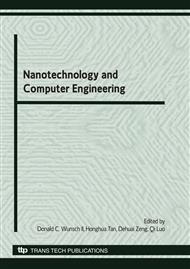[1]
S. L. Deng, C. P. Hu, and Y. F. Zhang: Study on Strategies for Intelligent Collection of Enterprise Competitive Intelligence, Journal of the China Society for Scientific and Technical Information, Vol. 26(2007), pp.620-626.
Google Scholar
[2]
J. H. Powell, and J. P. Bradford: Targeting Intelligence Gathering in a Dynamic Competitive Environment, International Journal of Information Management, Vol. 20(2000), pp.181-195.
DOI: 10.1016/s0268-4012(00)00004-9
Google Scholar
[3]
K. A. Sawka, D. B. Francis, and J. P. Herring: Evaluating Competitive Intelligence Systems: How Does Your Company Rate, Competitive Intelligence Review, Vol. 6(1995), pp.22-25.
Google Scholar
[4]
C. L. Lackman, K. Saban, and J. M. Lanasa: Organizing the Competitive Intelligence Function: a Benchmarking Study, Competitive Intelligence Review, Vol. 11(2000), pp.17-27.
DOI: 10.1002/(sici)1520-6386(200031)11:1<17::aid-cir4>3.0.co;2-3
Google Scholar
[5]
B. Liu: A Review of Performance of Competitive Intelligence in China and Overseas, Journal of the China Society for Scientific and Technical Information, Vol. 26(2007), pp.222-228.
Google Scholar
[6]
A. Lönnqvist, and V. Pirttimäki: The Measurement of Business Intelligence, Information Systems Management, Vol. 23(2006), pp.32-40.
DOI: 10.1201/1078.10580530/45769.23.1.20061201/91770.4
Google Scholar
[7]
H. Morten: Collaborative Information Seeking: The Combined Activity of Information Seeking and Collaborative Grounding, Information Processing & Management, Vol. 44(2008), pp.957-962.
DOI: 10.1016/j.ipm.2007.03.007
Google Scholar
[8]
M. Salles: Decision Making in SMEs and Information Requirements for Competitive Intelligence, Production Planning and Control, Vol. 17(2006), pp.229-237.
DOI: 10.1080/09537280500285367
Google Scholar
[9]
R. P. Vega: Economics and Theory of Games (Cambridge University Press, Cambridge 2003).
Google Scholar


